This is part 4 of a series of how I do my productivity and planning.
- Intro (an overview of what my goals are with this)
- Long-term planning (how I approach it)
- Doing things (task management)
- Tracking (keeping track of what I’ve done)
I started my spreadsheet tracking several years ago because several of my chronic health things are prone to slow onset of something flaring, until I suddenly wake up and realise that something is having a much bigger impact than it should.
The tracking allows me to catch that, course correct as much as possible (this usually involves “go to bed earlier and get more sleep, cancel some stuff for a few days minimum”), and make sure stuff doesn’t slide even more. However, that means I have to track both a chunk of the “is there some external factor for why I’m exhausted and can’t brain?” and what I’m actually getting done, so I can see how it changes.
(I do not track food, because that does bad things to my brain. Also, it’s really hard to do that in a way that a spreadsheet calculates and processes well.)
Part of my tracking is also to help me spot if I’m having a rough couple of days because I over did things – I can fairly easily see if I was extremely physically active one day, or slept horribly a couple of days in a row, or had a couple of really busy work days. There’s also a place to track if I felt sick or had a migraine.
Timeneye
I use Timeneye to track how long I spend on things. (I do rough tracking to keep an eye on how much time I spend on the bit of my work life that is contracted, plus also “how long does it take me to edit a book anyway?” type things. I have projects set up by astrological planet again. (For reasons that will become more apparent when I talk about the spreadsheet.)
I am not super fussy about starting the timer, sometimes I end up eyeballing how long I spent on something. But having a “This is how long this thing takes me” data has turned out to be really helpful.
Every day (or at least every Saturday), I tally up the total count into my physical planner (see part 2) and then transfer them into a spreadsheet. (a slash one way for half an hour, make an x for an hour, round up if unsure.)
I also put in notes, so for example, I can pull up all of my “editing” phases and see about how long each step of editing takes me, which makes it a lot easier to plan (at least broadly) how much time to allow for future editing.
I use the free version here: this is plenty unless you’re coordinating teams or need complex reporting.
One Spreadsheet To Rule Them All
This is the heart of my tracking. It has an absurd number of sheets and calculations (I’ve been doing this kind of tracking for… 4 years now?)
All the sheets are set up so I can filter by month (based on the column for month) so I can see a month at a time. There are a bunch of sheets, I’ll walk through them all below, with screenshots.
The images are from WestwoodWizardry on Etsy, who conveniently came out with a set of Astronomy clip art I love just as I was doing the later design changes. (Google Sheets now lets you insert images, you’ll see examples.)
Screenshots were taken on December 29th, so you can see a range of data (I had not yet done my writing for the night when I took them, so you can see the 29th is lower than it will be by the end of the evening.) I’ve also pixelated out a few personal details.
I pick a word of the year – as you can see, 2021 is “Enchant”, and that’s what I name the spreadsheet.
Summary:
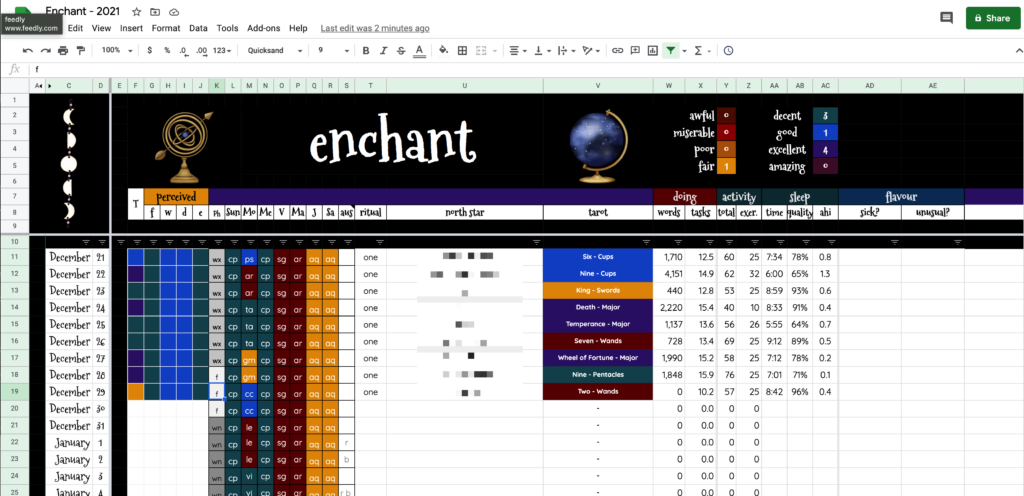
What it says on the tin: this sums everything up, and puts baseline totals all in one place. It has:
- Day
- Total for the day (based on points calculation, see the ‘scores’ page), conditionally formatted to show me the category it falls in.
- Perceived focus, willpower, joy (emotions), and embodiment that lets me signal when one of those things is working better or worse than expected. (5 point scale, I usually enter 3 for 90+% of my days, but it’s good to be able to flag the outliers.) If you want to think of these as “airy things”, “firey things”, “watery things” and “earthy things”, that’s probably more accurate, but less tidy as a label in a small space.
- Astrology info (signs for each of the 7 visible planets in astrological terms, plus auspicious days in shorthand). Taken from Benebell Wen’s Metaphysician’s Planner and colour coded with conditional formatting.
- Ritual: How many ritual things did I do (drawn from the “Spirit” sheet). Normally one for my daily offering stuff, but sometimes more.
- North Star + Tarot: Divination for the day (the pixelated items are a song from a playlist)
- Doing: Number of words written, plus the number for tasks accomplished (taken from the Doing sheet)
- Activity: Total minutes, minutes of exercise, sleep time, sleep quality, AHI from my CPAP machine.
- Flavour: If there’s anything unusual about the day I might want to remember (sick, vacation day, etc.)
The space at the top calculates the number of days in each of 8 categories. My goal is to have as many as possible in the cool colours, (i.e. good or better).
Doing:
Heavily revised this year, this one tracks how many things I’ve done, and in which categories. Previous versions were less nuanced on the “what was I doing”. I revamped this year to have a better sync between the way I track in Timeneye and the spreadsheet.

It’s worth noting that what isn’t directly tracked is ‘time spent reading about stuff in this category’ unless it’s focused ‘learn a new thing’ time, because I cannot figure out a way to track that with my brain that actually works and is not twice as much work to track as it is to do. I approximate “I read a bunch of blogs and related stuff” under Jupiter in the “input” column.
Basically, 1 = 1 hour. I have set things up this year to take fractional numbers more easily, but they round up in most columns except for the grand total. I have a running (rounded) total by broad category, so I can see the spread of things across a given day or span of days easily. Things under half a hour, it depends on how energy-demanding they were if I enter them.
FS is for “make things easier for my future self” and are things that are usually 15 minute type things – basic daily household cleaning, morning reading, processing through things to go into my long-term bookmarks or books to be read app. I track these on Notion and add up the checkboxes, the total gets divided by 4.
Moon: Magical, witchy, spiritual things.
- Witchy : Personal witchy stuff (personal ritual, etc.) Does not include my morning offering rituals (added in from the ritual column.
- Learning : Time set aside for learning a witchy thing
- PS : Phoenix Song, aka the coven (includes all actual coven activities, also prep and followup that isn’t my personal stuff.)
- S + TC : Seeking and The Cauldron
Mercury: For writing and related stuff.
- “write” comes from word count elsewhere.
- Edit is editing time.
- Learn is learning about writing stuff (courses, reading, etc.)
- Sharing is my newsletter, setting up social media sharing, etc.
- Admin is the random admin stuff that comes with this.
Sun: Day job, librarianing.
- Librarian is reference, being a librarian, etc. plus work adminy tasks.
- Meetings is meetings.
- Upkeep is ongoing projects (subject headings, right now) that make the library run better.
Earth: household and “I have a body, it needs things” stuff.
- Home is household – cooking, cleaning, etc. I don’t track routine ‘I made lunch’ but do track my weekly big batch cooking and other bigger projects.
- Self is things like medical appointments, meds prep every week, etc.
- Activity pulls from the “doing” sheet and gives me points based on how active I’ve been. (A calculation that gives me points for baseline goals, and then more points for hitting higher goals.)
Venus: Love, beauty, social stuff.
- Pleasure is stuff I do for the pleasure of it – concerts, museums, crafting, etc.
- Social is for social time (that isn’t coven time, basically.)
Jupiter: expansion and learning
- Input is where my baseline for “I read some stuff and learned some things” (most of the time I expect it to be about a 1 or 2. If I spend all day reading stuff, or spend a couple of hours deliberately reading, it’ll be higher.)
- Expand is where I’m deliberately going out and learning stuff/exploring stuff that isn’t under my Moon or Mercury learning. (Going to a lecture at a museum would count, or an online course about something other than those two topics.)
Saturn: planning and getting structure going.
- Plan is for planning time.
- Lioness is for the time I do data wrangling for my friend’s jewellery business (usually a couple of hours a month, occasionally more.)
Body:
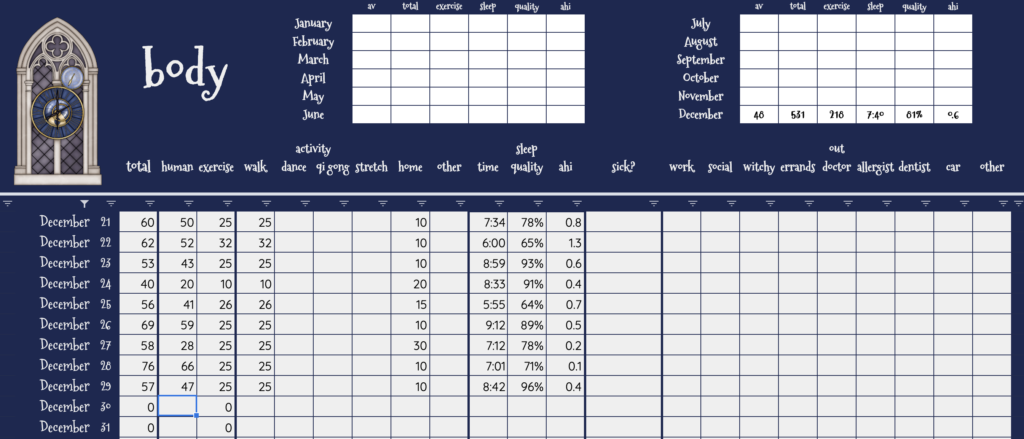
This tracks physical stuff.
- Activity: My pedometer app: total number on that.
- Exercise: Total exercise minutes
- The next columns have the different kinds of exercise I am likely to do.
- Home is “I was cooking/cleaning and my phone was on the counter” (so not picked up as activity)
- Then I track sleep: total time, quality (from my Sleep Cycle app), AHI score from my CPAP machine. I get points if I hit certain baselines on these.
- If I was sick (I lose a point if I was)
- What I went out to do (gives me points because going out to do things is exertion) One point for each thing I did.
Rivendell:
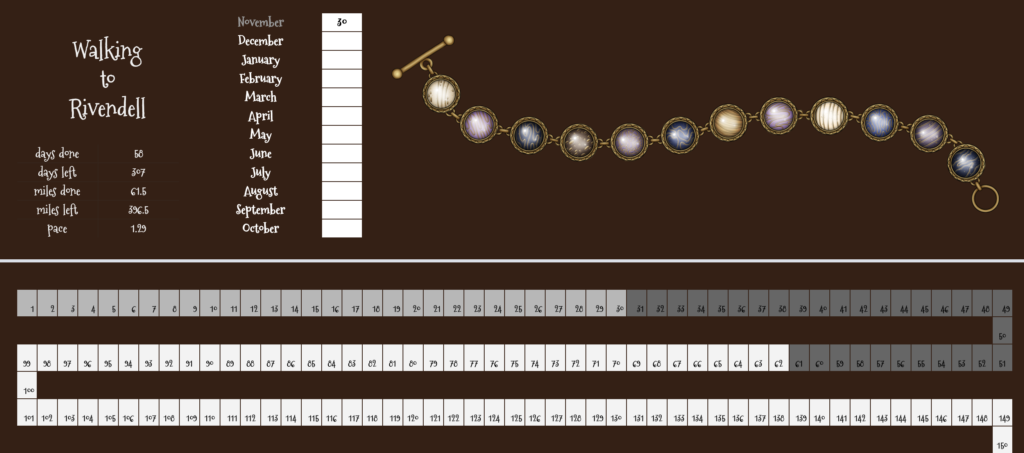
Also new this year: I’m doing the Walking to Rivendell challenge (I started at Samhain), to see if I can do the 458 miles to Rivendell in the year. I’m mostly on track.
You can see some pace calculations at the left. I set up a chain of boxes (one for each mile) that snakes down the page. I change the colour on the squares as I do miles, so I can see what I did each month.
(This gets me about 25 minutes of exertion to do 1.25 miles a day, which is better than nothing, okay? Right now I’m mostly walking at home with a walking video on for pacing and a podcast to avoid boredom)
Spirit:
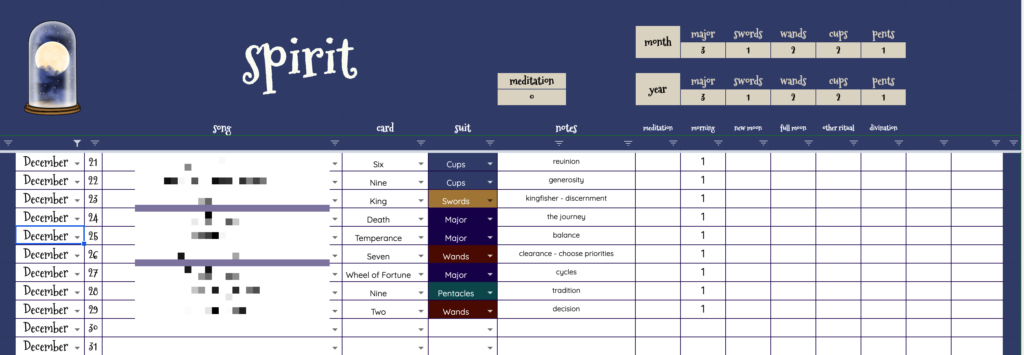
Detailed tracking on divination stuff. Song of the day, Tarot card of the day, some basic stats on suit breakdown, space to note other rituals I’ve done or meditation minutes.. Most days, this gets a “1” for my morning stuff. (I have a calculation that takes into account that this is 15 minutes of stuff, not an hour.)
Writing:
Now we get into the writing data. New this year is the summary page. It’s now set up so that it auto enters data from the writing log onto the daily page, which is then calculated onto the summary page. (Look, I like an elegant spreadsheet, okay.)
Writing summary:
Easy place to see all my totals in one place, and these lists are used to populate the next sheet’s data.
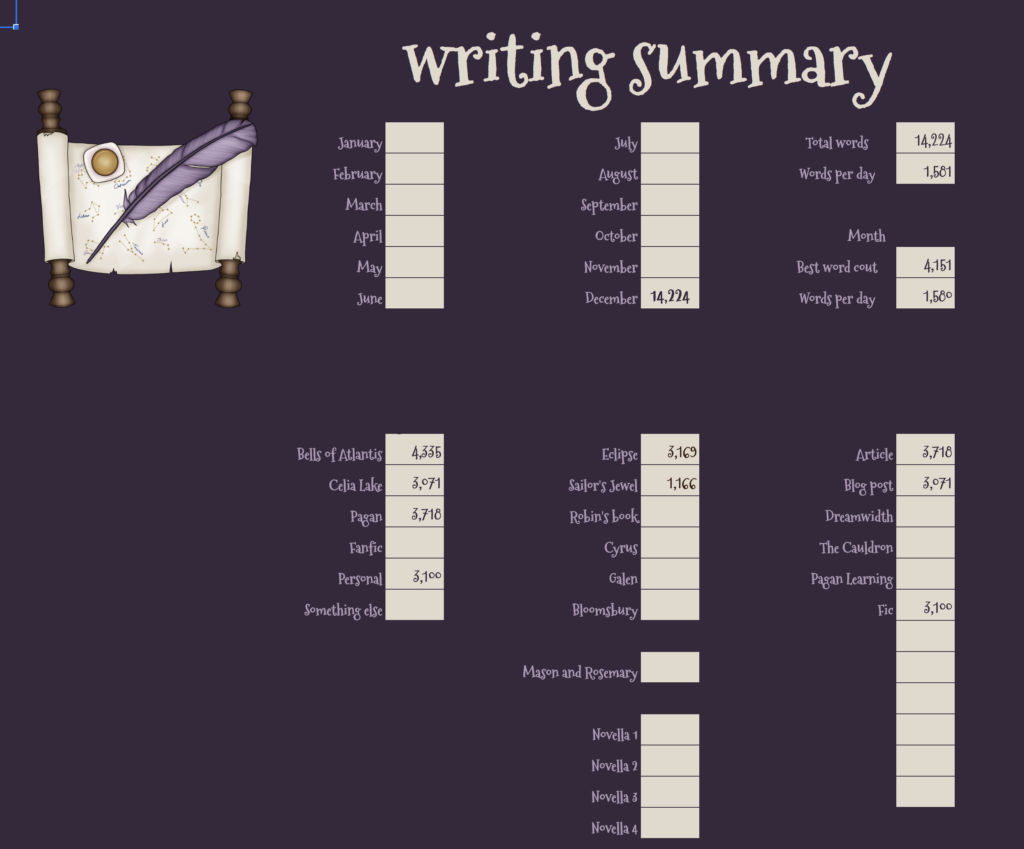
Monthly numbers (and calculations for pace)
Bottom left is the broad categories of stuff I write (Bells of Atlantis is my internal name for the 1920s world for … look, my brain’s weird, and that only makes sense to like 4 people reading this.) “Celia Lake” is for things that aren’t books – blog posts, newsletter things of length, etc.
Bottom centre is the actual books that fall into that category. I will fill in actual titles as things get titles (which fortunately for me, they do before I can write them, which simplifies my project tracking.)
The right bottom column is other kinds of writing by type. I only count substantial posts on Dreamwidth and on The Cauldron (usually that means ‘more than 1000 words and with some internal structure formatting’)
Writing:
The day by day totals, along with more precise tracking by month and book.
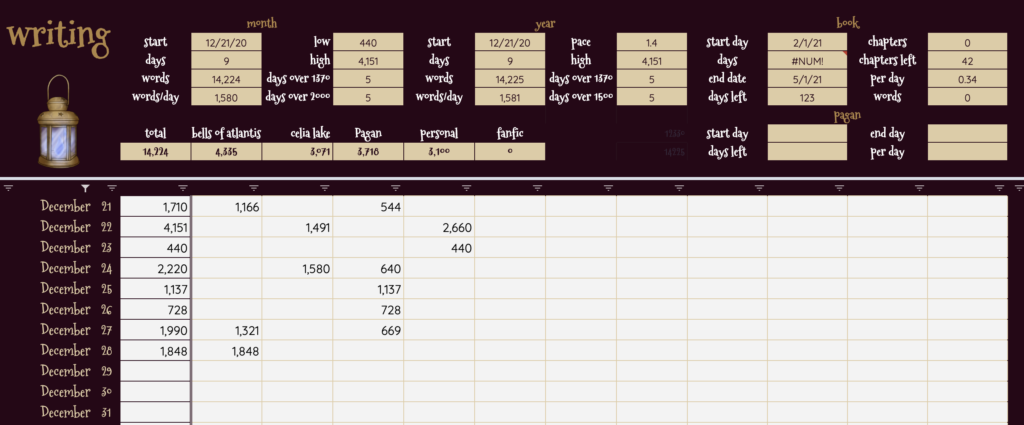
The top part gives me pace data, for the month, the year, and for the current book in progress. 1370 is my pace to hit my GetYourWordsOut goal, 1500 is what I’d rather hit. (This is a “every day words” goal.)
Each column here draws from a moderately complicated formula that pull data from the log page (keep reading) based on the category, so I don’t have to do math or type numbers more than once last thing at night.
Writing log:
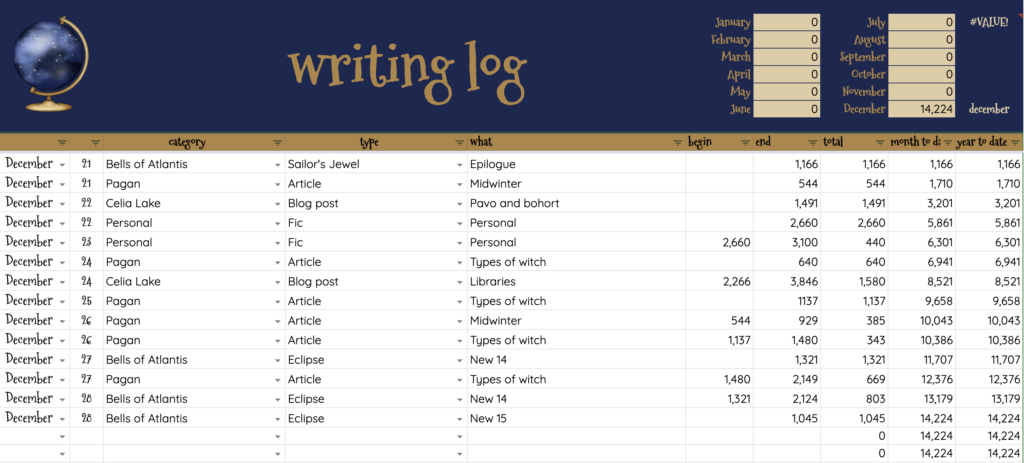
Where the log goes. Each thing gets a date, a category, a type, and then a freeform “what was it” (like the chapter, a short phrase of topic, etc.) and the word counts.
Foundation:
Debt payment tracking and retirement savings, updated once a month. (Regular budget stuff lives elsewhere.) You’re not getting a screenshot of this one.
4theWords:
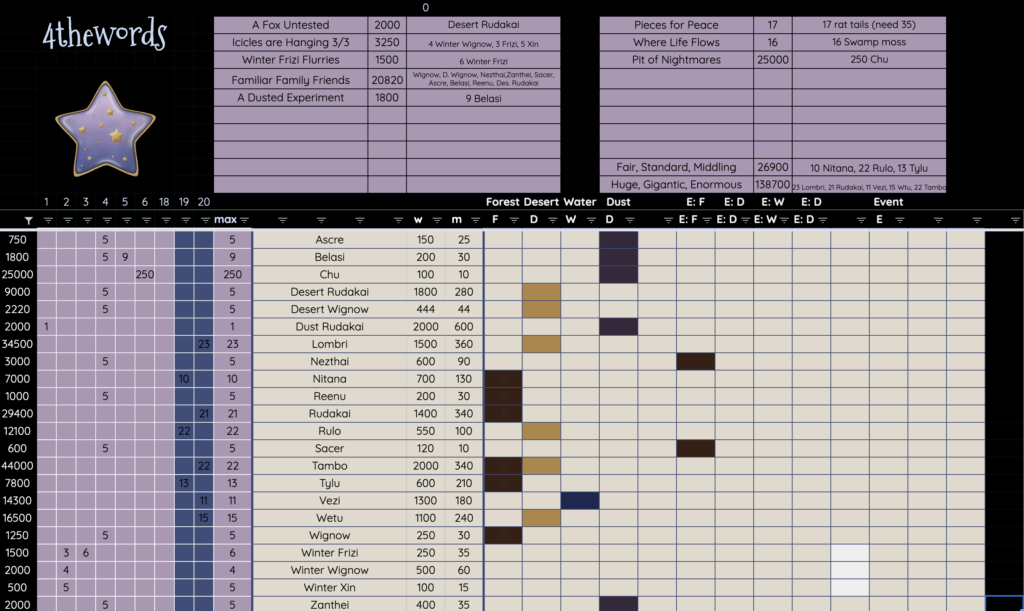
Where I track my current quests for 4theWords (a writing gamification site), with a spreadsheet that lets me figure out how many of which beastie I need to battle and plan what I’m doing on a given day.
I filter based on the column that has totals in it: I go through once a week or so and update the quests at the top. Basically, this lets me see how many words to finish a quest, where the thing I’m fighting is (so I can avoid back and forth travel) and if I have other quests that involve that thing. A little cludgy, but it works.
Reading:

What I’ve read (log, fairly minimalist, but includes a genre aspect.) New this year, info on what era I was reading about for historical stuff.
I also track pages (to help me realise that I read fewer books one month because they were longer). I include novel-length fanfic, and convert into pages at 250 words per page.
Planning:
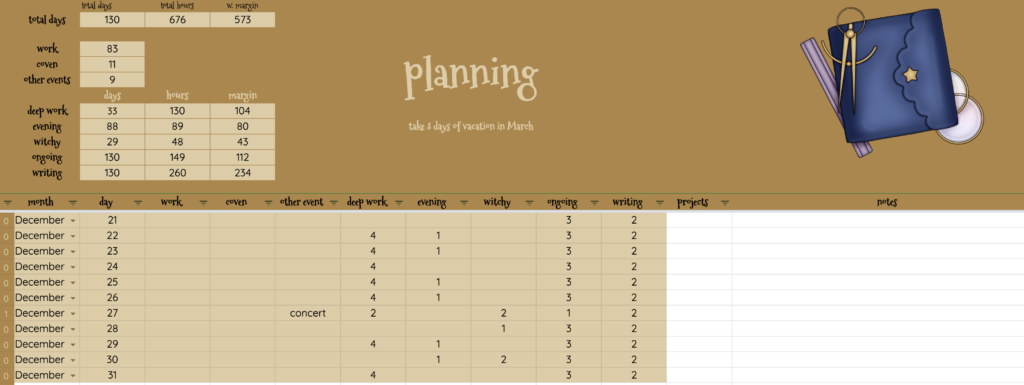
Sheet that lets me track out working days for larger projects and deep work time. The columns let me figure out how many hours of what kind of time I have. (The third column at the top is giving myself a margin – 90% of the total in most cases, because I know there will be days I’m not up for whatever the thing is.)
Stars:
Digital sticker sheet for my subject heading project at work (when actually in the office, this is a sheet with actual stickers, but needs must.) Basically, I give myself an image in a box when I hit the next 100 done.
Images:
Images imported for the stickers. (Almost all from WestwoodWizardry, linked above.) This way I just have to copy and paste them onto my star sheet.
Nano:
Pace spreadsheet specifically for NaNoWriMo.
Patterns:
So, I have a spreadsheet. It can calculate things. This takes the data entered on the summary sheet and does calculations (averages, mostly) based on current sign of zodiac for the sun, moon, phase of moon, season of the year, and day of the week. This was new this past year, and it’s gotten me some fascinating data:
- Sleep: My sleep app has told me I sleep less well on the full moon – it’s about 5% worse, consistently.
- I write most on Tuesdays. (And sleep best on Saturday nights, which isn’t surprising, because Sunday is almost always the only day I reliably don’t set an alarm.)
- I write a lot more when the sun is in Leo than other times (2400 words on average, the next closest are Cancer at 2300 and Libra at 2000). This is probably a little less reliable, because 2020 is weird. Since I generally feel less productive in the summer, this is fascinating.
- I write the most when the moon is Pisces, Leo, or Virgo. (And the least when it’s Capricorn or Aquarius).
Scores:

The sheet that actually adds up the numbers to give me a total for the day (so I can see the general quality of day). Basically, I took the possible number of points in a really good day, fiddled with some calculations, and came up with 28, so I have 8 groups of point totals.
In practice, I either have a totally awful day in which I do nothing (usually because I’m noticeably sick) and it’s the red (0-9 points) or lighter red (10-12), or I’m at least in yellow territory. I’m almost never in orange.
- 0-9
- 10-12
- 13-15
- 16-18
- 19-21
- 22-24
- 25-27
- 28+
I thought about extending the range this year, but honestly, my purple days (28+ are pretty excellent days, and I’m not going to fuss about exactly how awesome they are.
The calculation is:
- Average of the qualitative numbers on the summary sheet (usually 3)
- Bonus point if that average is over 2.9
- -2 points if there’s something in the “sick” field on the summary page.
- Ritual points taken from the spirit sheet (counts daily offerings as 1/4 of a point.)
- Words points taken from writing sheet (words divided by 1000 + 1 point for hitting my baseline goal (currently 1370) and + 1 for hitting my higher word goal (2000)
- Points for activity: one point for each “out” (going to work, errands), half a point each for hitting my baseline exercise (15 min) and general activity (45 min) numbers, an additional point for 30+ minutes exercise, or 90+ minutes general activity. Most of the time I expect this to be 1 point if I’m home, 2 if there’s a commute, and 3 if there’s an errand in the commuting times.
- The doing point calculated from that sheet.
- 1 point if I both get more than 7 hours and the quality of that sleep is at least 70%. (I do not do points based on AHI since there’s some stuff not entirely under my control that can mess that up without my realising it, and if I have an actually bad night, it’ll show up in the sleep quality.)
There! If you’ve made it this far, congrats! I hope you find at least some of this useful for your own life. Feel free to drop me a note in the contact form if you have questions.
- Intro (an overview of what my goals are with this)
- Long-term planning (how I approach it)
- Doing things (task management)
- Tracking (keeping track of what I’ve done)



